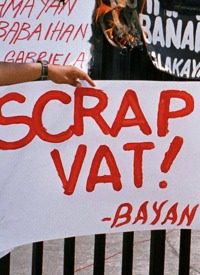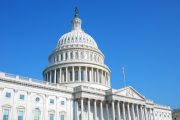
Time is running out on the Obama administration to pass a value-added tax: The mid-term elections are two weeks away with Democrats anticipating heavy losses, the lame-duck session is due to start on November 15, President Obama’s National Commission on Fiscal Responsibility and Reform publishes its report on December 1, and Congress already faces a long list of “must-pass” legislation. A just-released study about the negative impacts of a VAT isn’t going to help.
Obama’s “fiscal commission” is so heavily laden with big-spending politicians, union leaders, and liberal think-tank “scholars” that it certainly won’t miss this opportunity to promote a VAT to close the deficit gap. And that gap continues to widen. Earlier this week the Congressional Budget Office released its preliminary figures for 2010, showing government spending at $3½ trillion, the same as last year, resulting in deficits in just those two years approaching $3 trillion.
The study, sponsored by the National Retail Federation, was timed to deflect any move by Congress to inflict more damage on the economy during the last weeks of the 111th Congress. With the help of Ernst & Young LLP and Tax Policy Advisers LLC, the study looked at the impact a VAT would have on the economy in general and taxpayers in particular. Their findings are sobering:
1. An add-on VAT [a VAT added onto the existing levels of taxation] would reduce retail spending by almost $260 billion in the first year, and by $2 trillion over the next 10 years.
2. Gross Domestic Product would fall for at least several years, resulting in the loss of 850,000 jobs in the first year alone.
3. Most taxpayers would suffer a reduced standard of living, especially the younger generation coming into the workforce for the first time.
4. A VAT would force younger taxpayers to fund the shortfalls in public welfare programs supporting older generations. The report says a VAT “would have significant redistributional effects across generations, reducing real incomes and employment for current workers.”
Specifically, a middle income family of four with an income of $70,000 (U.S. median) would pay $2,400 more in value added taxes, which would double that family’s taxes for the year. And the VAT’s initial rate, estimated in the NRF study to start out at about 10 percent, “would likely increase over time due to continued political pressure … to finance any increase in government spending due to the availability of the VAT; such increased spending would be consistent with international experience.”
For instance, when the 10 countries cited in the study first inflicted a VAT on their citizens, the initial rate was 10.7 percent. Today it is 16 percent. Among the 30 OECD countries, the average VAT is 18 percent. And Great Britain’s VAT will increase on January 1 to 20 percent.
The report does have a bright side, however. If, instead of installing another tax mechanism, politicians were to cut government spending, the impact on reducing the deficits would be much more favorable, resulting in “more jobs, higher GDP, a better standard of living for Americans, and a less depressing effect on retail spending — in both the near term and in the longer term.” Specifically, through government spending cuts on the same magnitude as a VAT, 250,000 jobs could be added to the economy.
In summary, the report says that “perhaps the most troubling aspect of a deficit-reducing VAT is that, if enacted in the near future, its negative effects on GDP, consumer spending and employment would occur in the face of the current economic climate of weak economic growth, high unemployment, and low consumer confidence.”
What are the chances of serious consideration of such a draconian “solution” to the deficit problem? At this time there is increasing public support for such a measure from the usual suspects, including former Fed chairmen Paul Volcker and Alan Greenspan, House Ways and Means Chairman Charles Rangel, Obama’s Office of Management and Budget, and Speaker of the House Nancy Pelosi. With the mid-term elections so close, the rising chorus of discontent may drown out those voices. What is of real concern is whether such clamor from the American taxpayer will have any impact on last-minute efforts to enact such legislation before the 111th Congress mercifully disappears into the pages of history.
Photo of a protest against the VAT tax in the philipines: AP Images



